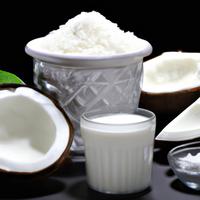
1 serving (100 grams) contains 230 calories, 2.0 grams of protein, 24.0 grams of fat, and 6.0 grams of carbohydrates.

Log this food in SnapCalorie

Nutrition Information
Calories |
547.6 | ||
|---|---|---|---|
% Daily Value* |
|||
| Total Fat | 57.1 g | 73% | |
| Saturated Fat | 50 g | 250% | |
| Polyunsaturated Fat | 0 g | ||
| Cholesterol | 0 mg | 0% | |
| Sodium | 35.7 mg | 1% | |
| Total Carbohydrates | 14.3 g | 5% | |
| Dietary Fiber | 4.8 g | 17% | |
| Sugars | 7.1 g | ||
| protein | 4.8 g | 9% | |
| Vitamin D | 0 mcg | 0% | |
| Calcium | 38.1 mg | 2% | |
| Iron | 3.8 mg | 21% | |
| Potassium | 523.8 mg | 11% | |
* Percent Daily Values are based on a 2,000 calorie diet. Your daily values may be higher or lower depending on your calorie needs.
Food Attributes
Source of Calories
About Leite de coco
Leite de coco, or coconut milk, is a creamy liquid derived from blending grated coconut meat with water, commonly used in Brazilian, Southeast Asian, and Caribbean cuisines. Rich in flavor, it serves as a base for curries, soups, and desserts. Nutritionally, coconut milk contains healthy fats, particularly medium-chain triglycerides (MCTs), which may support energy metabolism and heart health. It also offers small amounts of vitamins C, E, and B-complex, along with essential minerals like manganese, magnesium, and potassium. However, its high saturated fat content warrants moderation, especially for individuals monitoring cholesterol levels. Unsweetened varieties are preferred as they avoid added sugars, ensuring a cleaner nutritional profile. Whether included in savory dishes or blended into smoothies, leite de coco is a versatile ingredient that adds richness and depth to recipes while providing its unique tropical aroma and taste.



